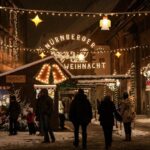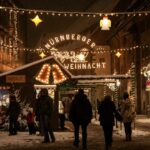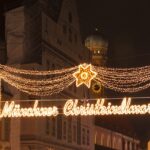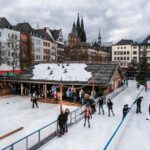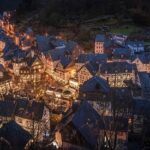
Germany’s oldest and most beloved Christmas market comes alive each winter in the heart of Nuremberg – the Christkindlesmarkt. With its wooden stalls trimmed in red and white, the scent of roasted almonds in the air, and the golden-haired Christkind opening the festivities, this market isn’t just a holiday event – it’s a cultural institution.
Welcoming over 2 million visitors annually, Nuremberg’s market has become a pilgrimage site for Christmas lovers from across Germany and around the world. Whether you’re sipping Glühwein under medieval spires or admiring hand-carved ornaments in the glow of candlelight, Christkindlesmarkt is where German holiday tradition feels most alive.
In this guide, we’ll take you through its rich history, unique traditions, best treats, iconic gifts, and practical travel tips to make the most of your visit.
Related: German Christmas Markets: A Magical Winter Tradition
A Market with Medieval Roots
While many Christmas markets in Germany boast a long lineage, Nuremberg’s Christkindlesmarkt stands out for its documented history and deep connection to the city’s identity. The earliest written reference dates back to 1628, though historians believe the market likely began earlier in the 16th century as an Advent fair.
The name “Christkindlesmarkt” literally means “Christ Child Market,” referencing the tradition of gift-giving associated not with Santa Claus, but the Christkind – a symbolic angelic figure introduced during the Reformation.
The market historically took place in front of Nuremberg’s Frauenkirche (Church of Our Lady), and it still does today. Set in the Hauptmarkt, the city’s central square, the setting remains breathtaking: half-timbered houses, gothic church towers, and the glow of thousands of lights.
The Christkind: Angel of the Market
Perhaps the most enchanting tradition of this market is the Christkind herself. Every two years, a local teenager is chosen to embody this golden-haired figure dressed in white and gold robes, crowned with a radiant halo.
She opens the market from the church balcony with a poetic prologue that draws thousands of spectators. Throughout the season, she visits hospitals, schools, and events – not just a symbol, but a living connection to Nuremberg’s holiday spirit.
Must-Try Foods of the Christkindlesmarkt
Food is one of the central joys of any German Christmas market, and Nuremberg’s culinary offerings are legendary. Here are the essentials:
- Nürnberger Rostbratwurst: Tiny but mighty, these sausages are grilled over beechwood and served three to a roll with mustard. Protected by EU geographic status, they must be made in Nuremberg.
- Lebkuchen: Nuremberg is Germany’s gingerbread capital. Look for Elisenlebkuchen – soft, nutty, spiced cookies often dipped in chocolate or glazed. Lebkuchen-Schmidt is a famous local brand.
- Glühwein: Hot mulled wine served in collectible mugs. Variants include cherry, blueberry, and Feuerzangenbowle (with rum-soaked sugarloaf lit on fire).
- Gebrannte Mandeln: Roasted almonds caramelized with cinnamon and sugar – the sweet smell that defines every German market.
- Fränkische specialties: Look for Franconian cheeses, soups, pretzels, and winter stews from the region.
Related: German Christmas Market Food: What to Eat and Drink
Shopping for Handmade Holiday Treasures
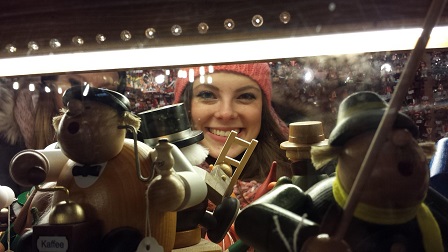
Nuremberg’s market is known for its strict regulations against mass-produced goods. Stalls are curated to ensure that only traditional, high-quality products are sold. Here’s what to look for:
- Zwetschgenmännle (Prune People): Whimsical figures made from dried plums, figs, and walnuts – a quirky Nuremberg specialty.
- Hand-carved wooden ornaments from the Erzgebirge region
- Stained glass and blown glass tree decorations
- Traditional Advent calendars and paper stars
- Wool socks, scarves, and handmade felt items
- Nativity figures and incense-smoking Räuchermännchen
Sister Cities and International Flair
Since 1991, the market has also hosted a special section called the “Market of the Sister Cities.” In this area, stalls represent cities from around the world that share partnerships with Nuremberg. You’ll find crafts, food, and gifts from places like:
- Atlanta, USA
- Skopje, North Macedonia
- San Carlos, Nicaragua
- Krakow, Poland
- Nice, France
This area adds a multicultural layer to the traditional festivities and celebrates international friendship through holiday exchange.
When to Visit and What to Expect
The Christkindlesmarkt traditionally runs from the Friday before the first Sunday of Advent through December 24.
Typical Dates: November 29 – December 24 (adjust slightly year to year)
Hours:
- Monday–Sunday: 10:00 AM – 9:00 PM
- December 24: closes at 2:00 PM
Key Events:
- Opening Ceremony: Friday evening with the Christkind’s prologue
- Children’s Market: Special area with rides and kid-focused stalls
- Christmas concerts at St. Sebaldus and Frauenkirche
- Choirs and brass bands performing from balconies
Tips for a Smooth Visit:
- Arrive early in the day to beat the crowds, especially on weekends
- Stay overnight to enjoy the quieter evening atmosphere
- Dress warmly and wear comfortable shoes – expect cobblestones and cold
- Bring cash – most stalls don’t accept cards
- Return your Glühwein mug for a refund, or keep it as a souvenir
Related: Planning Your German Christmas Market Trip: Tips, Routes, and Timing
Family Fun: The Kinderweihnacht
Just a short walk from the main market is the Kinderweihnacht, or Children’s Christmas Market. This delightful zone is perfect for families and includes:
- A mini Ferris wheel and old-fashioned carousel
- Cookie decorating and candle-making stations
- Puppet shows and storytelling sessions
- Child-sized booths selling toys, sweets, and tiny mugs of hot chocolate
It’s a safe, enchanting space where kids can enjoy the festivities at their own pace.
Beyond the Market: Explore Nuremberg in Winter
While the market is the star, the city of Nuremberg offers plenty more in December:
- Nuremberg Castle: Overlooking the city, especially magical with snow
- Toy Museum (Spielzeugmuseum): A favorite with families and nostalgic adults
- Germanisches Nationalmuseum: Learn about German cultural heritage
- St. Lorenz Church and St. Sebaldus Church: Gothic masterpieces
- Historic Old Town (Altstadt): Full of cobbled streets, half-timbered houses, and festive storefronts
A Quintessential Christmas Experience
Visiting the Christkindlesmarkt in Nuremberg is more than a holiday outing – it’s an immersion in centuries-old traditions that continue to thrive with warmth, elegance, and authenticity. Whether you’re sampling your first Nürnberger Bratwurst, buying a hand-carved ornament, or simply watching the lights twinkle against ancient facades, this market offers something no shopping mall can: heart, history, and holiday magic.
If you can visit only one Christmas market in your lifetime, let it be this one.
Discover More in the Series:
- German Christmas Markets: A Magical Winter Tradition
- Hidden Gems: Small German Christmas Markets Worth Visiting
- German Christmas Market Food: What to Eat and Drink
- Planning Your German Christmas Market Trip: Tips, Routes, and Timing
- German Christmas Markets Quiz
- Eierlikör – Traditional German Egg Liqueur Recipe
- Eierlikörtorte – Traditional German Egg Liqueur Cake Recipe

